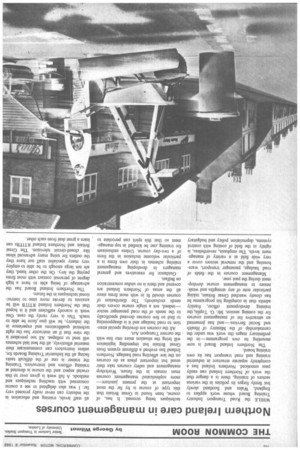Northern Ireland care in management courses
Page 104

If you've noticed an error in this article please click here to report it so we can fix it.
WHILE the Road Transport Industry Training Board whose work applies to England, Wales and Scotland slowly but firmly forges its policies in the various sectors of training, there is a danger that the work of Northern Ireland can easily pass unnoticed. Northern Ireland has a completely separate structure in industrial training and road transport has its own training board.
The Northern Ireland Board is now mounting its own programme—in the preliminary stages the work was under the caretakership of the Ministry of Health and Social Services—and has Presented an attractive list of management courses for the coming session. Mr. G. Toplis, the training development officer, frankly admits that in compiling his programme he has closely watched Great Britain, taking particular note of any strengths and weaknesses in management course development during the past year.
Management courses in the • fields of road, haulage, passenger transport, warehousing and the removal sectors cover a very wide field at a variety of management levels. The emphasis, nevertheless, is rightly in the field of costing with control systems, depreciation policy and budgetary techniques being stressed. It has, of course, been found in Great Britain that this type of course is by far the most important at the present juncture— more sophisticated management courses must remain in the future. Workshop management and safety courses take their usual but important place as do courses on the law affecting road haulage. Northern Ireland has evolved a different system from Great Britain but impending legislation will bring the situation more into line with . the current Transport Act.
All the courses are directing special attention to road haulage and it is disappointing to find so few courses devoted specifically to the needs of the road passenger sector —indeed, not a single course covers their needs exclusively. The distribution of courses should fit in with most firms since all the areas of Northern Ireland are covered and there is no undue concentration on Belfast.
Guidance for executives and general managers in developing management training schemes in their own firms is a particular welcome inclusion in the form of a two-day course. Unless enthusiasm for training ,can be kindled in top management so that this spirit can percolate to
all staff levels, training and education in the industry can never really proceed very far. I was also delighted to see a course concerned with teaching techniques and methods. A full week is given over to this crucial aspect and the course is directed at training officers and instructors. Training the trainer is one of the difficult tasks facing all the Industrial Training Boards for, unless instructors can communicate their material effectively, all the best laid schemes will tend to collapse. All too prevalent is the view that if an instructor has the right technical qualifications and experience in the industry, he will ipso facto be able to teach. This is very rarely the case. One week is scarcely sufficient and it is hoped that the Northern Ireland RTITB will be anxiods to devote more time to instructional techniques in the future.
The Northern Ireland Board has the advantage of being able to have a high degree of personal contact with most firms paying the levy. On the other hand, they de not large enough to be able to employ very many specialist staff nor have they the outlets for using many advanced ideas like closed-circuit television. The Great Britain and Northern Ireland RTITBs can learn a great deal from each other.




























































































































































